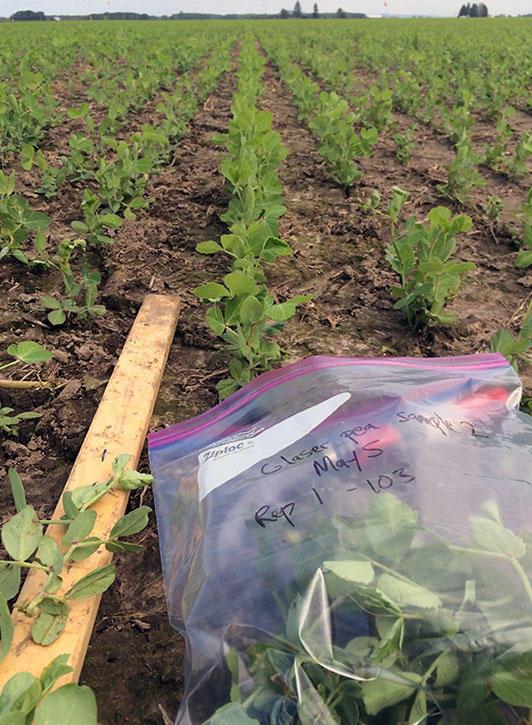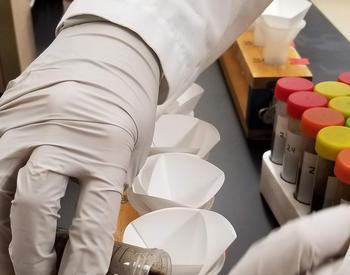Today’s gardeners, homeowners and commercial growers make data-informed decisions. They send samples of plant tissue, soil and water to laboratories for testing. But this testing may not always give them useful answers. This guide will show you how to work with your lab to achieve actionable results.
OSU nutrient management guides and soil testing protocols
Fertilizer recommendations in OSU nutrient management guides are based on specific soil test protocols. The recommendations in these guides are based on field research, and are specific to the soil types found in Oregon.
To be able to apply OSU’s recommendations, choose a lab using the testing protocols specified in the guide. Results from any other test method may produce unreliable fertilizer recommendations.
To ensure you can use your analytical lab results:
- Sample to the same depth or use the same plant part and growth stage specified in the nutrient management guide.
- Make a composite sample from the recommended number of subsamples.
- Sample at the recommended time of year.
- Request the same analytical method specified by the nutrient management guide.
Soil tests correlated to Oregon soils
Table 1. OSU-recommended soil test methods
- Soil pH: 1:2 soil pH
- Buffer phH for lime requirement: Sikora or SMP method
- Extractable phosophorous: Olsen extraction (for alkaline soils, primarily in Eastern Oregon or Bray P1 extraction (for acidic soils, primarily in Western Oregon)
- Extractable potassium, magnesium, sodium and calcium: ammonium acetate extraction
- Nitrate and ammonium: potassium chloride extraction
- Sulfate sulfur: calcium phosphate extraction
- Zinc, manganese, copper and iron: DTPA extraction
- Boron: hot water extraction
- Soil organic matter: Combustion (calculated from C concentration for noncalcareous soils) or loss on ignition (LOI)
Sampling for farms and gardens
Soil fertility and plant nutrients and growth stages vary depending on the season, their geographic location and their position in the landscape. Sampling protocols vary depending on your goal, so be clear on your reasons for submitting a sample. Tell the lab how you will use the test results.
To ensure lab results are useful, learn when, where and how to sample your soil. See A Guide to Collecting Soil Samples for Farms and Gardens, EC 628. Local Extension faculty can also confirm that you are following standard sampling procedures. Find your county’s OSU Extension office.
If your main concern is to understand why plants don’t grow well in a certain area, a soil or plant nutrient analysis might not answer all your questions. Work with your local Extension faculty to assess potential barriers and develop a plan to resolve plant performance issues.
Testing for contaminants
You may be concerned that plants, soils and water have been contaminated with heavy metals or other substances.
- If your concern is environmental health, look for a certified lab that uses methods that match the standards set by health and safety regulations.
- If your concern is contamination, conduct land use research based on historical records to narrow down potential contaminants. It is prohibitively expensive to have soil or water analyzed for all possible contaminants. Find more detail about these methods, standards and regulations in Reducing Lead Hazard in Gardens and Play Areas, EC 1616.
Find details for well-water sampling and interpretation of well-water analyses in the Water Well Owner’s Handbook, A Guide to Water Wells in Oregon. You can also contact OSU’s Well Water Program for guidance.
Testing for soil health
Soil health testing can help you assess how changes in management have affected your soil’s function. However, there is little standardization in soil health testing protocols, and these tests will not provide you with a fertilizer plan. Soil health indicators are primarily used to compare changes in biologically driven characteristics over time, or between fields with different management histories. Sample areas under different management practices separately.
Soil organic matter is the first and most critical component to understanding soil health. See Soil Organic Matter as a Soil Health Indicator: Sampling, Testing and Interpretation, EM 9251.
Before you submit a sample
Visit the lab’s website or call in advance to confirm that the lab can give you the results you seek. Also confirm that the methods it uses are correlated to Oregon soils. See Soil Testing Lab Selection and Recommended Analytical Methods for Oregon, EM 9423, for soil test methods recommended by OSU (Table 1).
You can also consult your local OSU Extension Service faculty before you submit samples to a laboratory. They can help ensure that the analysis you request will give you information to support your management decisions.
Also confirm with the lab:
- The size of the sample required.
- How to package and ship your sample. Depending on the test, samples may require shipment on ice.
- Which day of the week the lab prefers to receive your sample.
- Average turnaround time for results at the time of year you are submitting the sample.
If you are interested in fertilizer or liming recommendations, confirm that this service can be provided. Note: Fertilizer and liming recommendations provided by labs will generally differ from those detailed in OSU’s nutrient management guides. Consult your local OSU Extension Service faculty to understand recommendations.
Confirm that the lab contact understands the decisions you want to make from your test results. This will ensure that you get the highest quality information from your investment.
Find an accredited laboratory
Analytic labs can participate in accreditation programs by professional organizations. Or, they may participate in proficiency testing programs specific to the types of tests they perform. These are good indicators of consistent and high-quality results. If you have questions about the accreditation of a laboratory, be sure to ask before submitting your samples.
Find accredited labs:
- For soil and plant nutrient analyses: North American Proficiency Testing
- For water quality and environmental contaminant analyses: Oregon Environmental Laboratory Accreditation Program. Note that other states have similar environmental lab accreditation programs.
- For compost analyses: U.S. Composting Council Seal of Testing Assurance Certified Laboratories



